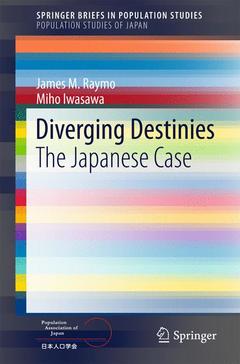Diverging Destinies, 1st ed. 2017 The Japanese Case Population Studies of Japan Series
Auteurs : Raymo James M., Iwasawa Miho

Emphasizes the link between family behavior and processes of social and economic stratification as one of the most important topics in current research on the second demographic transition
Employs distinctive features of Japanese society to extend research on growing socioeconomic differentials in family behavior in ways that are both interesting and important
Summarizes, updates, and synthesizes the existing research on this topic in Japan, much of which has been conducted by the authors
Includes supplementary material: sn.pub/extras
Date de parution : 08-2016
Ouvrage de 62 p.
15.5x23.5 cm



